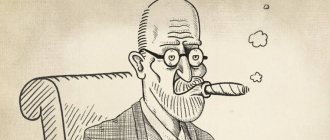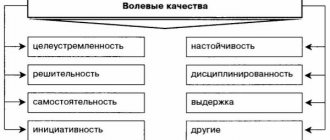According to the theory of psychoanalysis, a person who is in a stream of endless mental conflicts and compromises, in order to maintain the required level of balance, naturally creates a number of defense mechanisms, the main reason for the formation of which is anxiety.
It comes from the experience of being unable to cope with internal or external urges and helps to cope with negative emotions and has a positive effect on a person’s psychological stability, however, it is not a solution to internal problems and conflicts.
Rationalization
Rationalization is the artificial creation of logical explanations for actions and failures. This is necessary to maintain a positive judgment of oneself.
For example, you need to call some person and agree with him about something. Let's say that for some reason you are embarrassed or even afraid of this. Then you begin to rationalize your refusal to make the call: it’s too late, you don’t need it at all, etc.
In many ways, we hesitate to admit to ourselves and unconsciously come up with rationalizations. They tend to be very logical and therefore difficult to recognize.
Literature on the topic
In conclusion, I recommend you the book by Vadim Evgenievich Levkin, “Conflict Independence Training: A Training Manual.” This is a practical guide to changing yourself, your behavior and defense mechanisms (conscious and unconscious). The material is written in everyday language, supported by examples, and all recommendations are laid out point by point. A true guide to life.
I also advise you to read the articles “Types of conflicts in psychology” and “Types of conflicting personalities and their characteristics.” Good luck with self-regulation!
Introjection
Introjection is the inclusion by a person of attitudes, opinions, etc. perceived from other people. into your inner world.
Introjection plays several roles:
- Adaptive. Young children “absorb” the views and attitudes of their parents.
- Protective. For example, young children are in fact defenseless, but due to the appropriation of the qualities of their parents, they do not recognize themselves as such. In adults, this process takes the form of identification, which we will discuss separately.
- Destructive. This defense mechanism causes a person to perceive something external as something internal. Consequently, the loss of this external is felt as the loss of something internal.
Introjection also underlies the famous Stockholm syndrome.
Fantasies: Brave New World
Fantasies allow you to temporarily improve your emotional state through the work of your imagination. Daydreaming, reading, computer games, and even watching porn give us the opportunity to move from a difficult situation to a place where we feel more comfortable. From the point of view of psychoanalysis, the emergence of fantasies is due to the desire for fulfillment, satisfaction and fulfillment of desires that cannot yet be satisfied in the real world.
Fantasies absorb suffering and help calm the personality. Nevertheless, the psyche is not always able to fully recognize where reality ends and the imaginary world begins. In the era of information technology development, a person can enter into a relationship with a media image, dreaming about his favorite actress or interacting with his favorite computer game character. The destruction of such relationships due to unsuccessful contact with the real content of the image or unpleasant situations will be experienced as a real loss and will bring emotional pain. Fantasies can also distract a person from the real world. At the same time, they often become fertile soil for creativity and form the basis of successful works, bringing positive results in reality.
Cancellation
Cancellation is a mechanism for eliminating actions or thoughts that are unacceptable to a person, an attempt to balance some feeling (most often guilt or shame).
An example would be a gift given by a person who is guilty of something. But it should be emphasized that this will only be an annulment if a person takes this step unconsciously.
That is, he must have a sincere desire to give something in order to eliminate the feeling of guilt. If he is simply accustomed to paying off for his misdeeds and gives something because “it’s the right thing to do,” this is no longer an annulment.
Substitution: Transference of Anger
Substitution allows you to transfer unwanted feelings (especially anger and irritation) from one object to another for the purpose of self-defense. A person who was yelled at by his boss may not answer him, but he will yell at his child at home in the evening. He needs to vent the anger that has arisen, but doing this in communication with his boss is dangerous, but the child is unlikely to be able to give a worthy rebuff.
A random object can also become the object of replacement. In this case, the result of this defense mechanism is, for example, rudeness in transport or rudeness in the workplace. An unfinished drawing torn in anger is also a form of substitution, however, much more harmless.
crowding out
Repression is the process of eliminating unfavorable feelings, thoughts, desires, etc. from consciousness. That is, a person seems to get rid of what brings him pain, a feeling of shame or guilt.
Repression explains many cases of forgetting something. For example, you need to go to a meeting with a very unpleasant person. Just the thought of it causes you real suffering. To get rid of this oppressive feeling, your psyche represses the thought of the meeting, as a result of which you forget about it for a while.
Reactive education
Reactive education is a defense against forbidden impulses by expressing opposing impulses in behavior and thoughts. If a feeling cannot be expressed (for example, it does not correspond to social norms), it is replaced by the opposite.
For example, an older brother may experience aggression towards a younger brother, because... because of him, his parents began to pay less attention to him. Of course, showing your hatred for your brother is unacceptable, so aggression can unconsciously transform into overly active care.
Or a more banal example: a boy who pulls the pigtail of a girl he likes.
Conditions that trigger protection
The mechanisms of psychological defense of the individual are not formed at the level of the main regulator of human behavior - consciousness. Freud scientifically substantiated the existence of a deep level of the unconscious, filled with aspirations, drives and desires.
Freud realized that unconscious experiences significantly influence a person’s life and behavior, and also become the cause of neuropsychiatric diseases.
To understand the nature of the emergence of defense mechanisms, it is necessary to determine the structure of the human psyche:
- Id (“It”). Innate human aspirations, instinctive and irrational impulses of the psyche.
- Superego (“Super-ego”). The highest system of human values, acquired by him in the process of mastering the rules of behavior and social norms
- Ego (“I”). The part of the personality responsible for making decisions appears only as a result of the conflict between the Id and the Superego.
According to this theory, the Ego (“I”) tries to control the impulses of the “It.” At the same time, the Ego tries to come to terms with the Superego and its norms and taboos. The main conflict occurs between innate aspirations (Id) and the higher value system (Superego).
The ego reduces anxiety by working by channeling negative impulses into behavior that is positive and socially satisfying. In this, a person is helped by mental defenses, which vary depending on the situation and the severity of internal personal contradictions.
Self-restraint
When a person realizes that his achievements are inferior to the achievements of other people, he resorts to the described mechanism and stops his activities - he limits himself. Thus, self-restraint is an escape from difficulties towards frustration.
Anna Freud gives the following example of self-restraint:
She and the little boy were drawing together. The boy was doing this with enthusiasm, but then he looked at how Anna was drawing and put the pencils aside.
Losing is unpleasant. And to avoid losing, people refuse to compete at all.
Mechanisms of self-regulation disorder
Sometimes our body malfunctions, unconscious mechanisms are switched off, conscious ones turn out to be insufficiently mastered, which is expressed by fixation on the conflict (problem), deep feelings and the impossibility of adequately resolving the situation. What are these mechanisms?
- Introjection. Separation of undesirable samples into a separate category of personality, which is not perceived by the person himself.
- Retroflexion. The inability to satisfy needs directed to the external environment is manifested by redirecting energy towards oneself.
- Deflexion. This is a departure from close interpersonal interaction to superficial ones: chatter, buffoonery, conventions.
- Merger. Involves the elimination of boundaries between the external and internal world.
As a result of each of these violations, a person abandons part of his Self or completely loses his individuality.
Split
Splitting refers to the transition to black and white thinking, thinking in terms of “good” or “bad” and devoid of any uncertainties.
Actually, this protective mechanism is aimed at getting rid of uncertainties. Our experience is contradictory, and it is difficult for us to bring it into a unified whole.
Often they resort to splitting in order to characterize themselves as a good person. The formulation “I have both good and bad qualities, so I can’t definitely be called either bad or good” suits few people. But if we reduce everything to two possible options, we have the right to call ourselves good.
Cleavage is also used to characterize social groups. Representatives of the same social group differ from each other, but it is more convenient for us to endow them all with the same set of qualities.
Chapter IV
PSYCHOLOGICAL PROTECTION
Psychological defense is one of those phenomena that is consistently considered by a wide variety of psychological teachings. This term is used in Gestalt psychology, psychoanalysis, and even in behaviorism, where it is called “perceptual defense.” These scientific directions in psychology have very little in common with each other, sometimes they are simply opposite. But the term “psychological defense” is used by everyone when constructing their concepts. And, apparently, it will be used in the further development of science, since this is one of the few phenomena defined quite fundamentally and reliably.
The concept of “psychological defense” was born within the framework of the psychoanalytic school. The isolation of this concept was natural for psychoanalysis, because the simplified structure of the psyche provided for the presence of protective mechanisms in order to suppress and change non-normative, forbidden, socially disapproved human desires. But, we repeat, it is noteworthy that almost all psychological schools that stand on a variety of petitions regarding the human psyche, one way or another, used this concept. This fact itself suggests that this is one of the basic concepts in human psychology, a kind of universal phenomenon that is integrated into all psychological pictures of the world and psychological ideas about the nature of the human soul. Psychological defense is a constantly occurring phenomenon, and not something unique. In addition, this concept is closely related to the idea of adaptability of the psyche.
What is psychological defense - an Achilles heel or armor, without which a person would die? It is both, depending on the situation. There are extreme situations when a person is practically deprived of the possibility of adequate functioning, for example: a qualified doctor informs a person that he has inoperable cancer that cannot be cured. Which is better: if he “removes” the thought of cancer from his consciousness and believes that he has severe gastritis, or admits that the doctor is right, as a result of which he will experience deep depression, which will poison the remaining days of his life. In this situation, apparently, the first is better. If this is an operable situation, and a person, knowing about his illness, carries out the necessary treatment and then lives for many years, then in this case psychological defense can play a fatal role, cutting off the person’s path to treatment.
Previously, a disease such as neurosis (a special form of the human psyche’s response to stress) was viewed unambiguously as a gap in psychological defense, a broken armor. Later it was discovered that neurosis is an exaggerated psychological defense - a special, too heavy armor. Then, under the influence of many facts, the assertion appeared that neurosis occurs both as a result of impaired psychological defense and as a result of too powerful psychological defense.
Another important question: why did psychological defenses arise in humans, and can a person live without them?
The man is so complex and contradictory. The reality surrounding him is also complex, in which, one way or another, a person must combine with what is often incompatible with his inner motivations. In order to adapt to oneself and to the world around us, psychological defenses arose. The main meaning of psychological defense is adaptation: “I” adapts to “I”
and the self adapts to the world. This is an adaptation between changeable and almost unchanged, between human biology, which is conservative (food, drink, sexual instinct, temperament), and the culture in which a person lives. There is also the culture of the family, which may be very different from the culture of society, and this will be another thing to adapt to. A person who fits well into the culture of his family may not fit into the culture of society at all. Therefore, there is no person on earth without psychological protection; one cannot remain naked in the Arctic cold; psychological protection is a person’s clothing. The tale of the naked king is a wise tale about psychological protection. Each person at some point in his life is inevitably a “naked king.” The difference between people in this case is that some are more “naked kings”, others less, some more often, others less often. For example, a man strokes his stomach and the image of Carlson appears in front of him, who was very proud of his fatness, and suddenly realizes that this is his psychological defense: because he used to be thin and slender, but now he is worried that with age he is getting fatter and that he doesn't like his growing belly. How did his psychological defense work? In a moment of concern for his growing belly, she slipped him the nice Carlson so that he would not be afraid and would know that this was normal, this was good and he could be proud of it. This means that a person can note some psychological defenses in himself and work with them.
The first stage of working with psychological defense is the stage of its diagnosis. But diagnosing psychological defense in itself does not give anything. In medical practice, there was a case when psychotherapists taught their patients to diagnose their psychological defenses and received the following: these patients continued to function in the same unconstructive way, their treatment did not progress, but during the work of the psychotherapeutic group they joyfully remarked to each other: “And you - psychological protection! Therefore, the main question is how to work with psychological defense. In fact, training a psychotherapist and training in psychotherapy is in many ways training to work with psychological defense: a) a psychotherapist or doctor; b) patient.
Working with the doctor’s psychological defense comes first because he is the same person, and therapy and its success will depend on his psychological defense.
To understand what psychological defense is, it is necessary to look at this phenomenon as a function that provides more adaptive interaction with the outside world. When a restructuring of the perception of the situation in the external world occurs, allowing a person to relieve tension and discomfort, this means that psychological defense has begun to work.
Functions of psychological
defense
1. Integration of personality, that is, the ability to make the human “I” whole and consistent, to protect it from decay. A classic situation when many “I”s coexist in a person at the same time. In order to bring these different selves together, psychological defenses are necessary. This is a kind of cement that does not allow it to disintegrate into many “I’s.”
In the training of personal growth groups, there is an exercise, the brief meaning of which is to meet your different “selves” in the process of meditation. One of the participants, having met her selves, discovered that they were very different - women and men of different ages and appearances, but they had one feature that united them all - they were all shaggy. This shaggyness is something like a psychological defense that united these people; it is a kind of perceptual defense for a person who, having experienced these sensations, wanted to preserve the integrity of his “I”.
2. The main function of psychological defense is as follows: firstly, achieving the required level of self-esteem, self-approval, “self-stroking”, and secondly, obtaining social approval. Moreover, some people are focused in their psychological defenses mainly on obtaining social approval, and only then do they develop self-esteem. American psychologist Eric Berne calls this social approval “stroking.”
For people of a different type, self-esteem is less connected with social approval. The vast majority of people belong to the first group. A significantly smaller part belongs to the second; they, very conditionally, can be called “nonconformists.” They are not egoists, not egocentrics, but people for whom the value of their own “I” and the value of their own judgments are higher than the delusions of many. Such people, contrary to the general belief that the Earth is flat, prove that it is round, that the Sun does not revolve around the Earth, but the Earth revolves around the Sun, such people prove that some social phenomenon is not as good as others claim.
Personal growth groups are in many ways groups of working with one’s own defense, an attempt to see oneself without that mirror that distorts people’s view of themselves. In one of these groups, during an exercise to overcome psychological defenses, a young doctor, when he needed to “see” himself in the form of some animal, saw that a skinned chicken fell from the sky towards him. He was confused: “I considered myself a strong person, extraordinary and extraordinary, I thought that an eagle would fly.” This does not mean at all that this person is a “torn chicken,” but his problem was that deep inside himself, without psychological protection, in many ways he unreasonably perceived himself as a plucked chicken.
3. Hiding true motives and desires from consciousness is another function of psychological defense. The previous example is a proof of this function. In other words, psychological defense is the ability not to know the truth that you don’t want to know about yourself.
4. Appearing before the world as the world wants to see a person is also a function of psychological defense.
It helps a person feel socially normative, socially acceptable, socially approved.
5. Psychological defense not only protects a person from reality, but also from those negative qualities that a person does not really possess, but recognizes them in himself, suspects that he has them. It turns out that psychological defense “saves” from mythical shortcomings.
For example, a person with a very long nose “scientifically” develops his theory that people with long noses are direct descendants of Martians, and therefore have special mental abilities, and in general they are better than those with short noses.
A long nose is a real quality, it can be measured in centimeters, but, for example, greed, which a person ascribes to himself and is afraid of discovering in himself, cannot be measured in centimeters. Therefore, when working with psychological defense, a psychotherapist must clarify: what does psychological defense protect against—from a real defect or an imaginary one.
For the first time, a serious description of psychological defense is found in Z. Freud and its meaning is as follows: this is the protection of our conscious “I” - “ego”, which is flattened between the “superego” (social norms, cultural ideas that prohibit many biological calls of the human unconscious) and "id".
In practice, there is a known case where a woman hairdresser had a constant obsessive desire to cut off her client’s ear. This desire was so strong that one day she could not cope with it and cut the boy’s ear. After that, when this desire became irresistible, she called her partner and asked her to cut the client’s hair, citing indisposition. She then turned to a psychotherapist for help. In this situation, the motive to inflict wounds and damage to another is in conflict with social norms. In Paleolithic times there were no such social norms, and aggression and causing physical harm to others was a natural thing, therefore, psychological protection from such a desire in the form of neurosis was not needed. All the prohibitions that humanity now has: do not kill, do not steal, do not commit adultery, and others - they all appeared in the process of the development of civilization and the formation of culture. Together with them, the content of psychological defenses was also formed. Man found himself between two fires: between primordial instincts, which are biologically determined, and social, cultural norms. And in order to avoid the feeling of guilt for one’s desires, a person develops a psychological defense, which becomes a buffer between the “superego” and the “id,” between the dark in a person, what his personality refuses to accept, and the demands of the surrounding world.
There is no generally accepted definition of the concept of “psychological defense” today; each of the psychological directions highlights its own characteristics of psychological defenses in the concept. But these differences do not lie in the general assessment of this phenomenon, but in the preferential consideration of one or another aspect of it. Some researchers focus on how this is done, what are the mechanisms by which psychological protection occurs. Others describe, first of all, why this is done, what the purpose of psychological protection is. There may be different solutions within the second direction.
The conclusion depends on the position of the researcher: what psychological defense leads to, what it creates. A certain terminological problem arises here: the word “protection” seems to say that this is a mechanism that is clearly useful for humans. Therefore, one of the reasons why purely terminological divisions of this phenomenon occur is the desire to move away from unambiguity in the concept of the success and usefulness of psychological defense.
In Russian literature, problems associated with the term “psychological protection” were determined by socio-historical and political reasons. The concept of psychological defense was clearly a psychoanalytic concept, and therefore bourgeois, hostile. Then the term “psychological compensation” appeared in Russian literature. To some extent, it even more accurately reflects the essence of this phenomenon. In the book of the famous psychotherapist F. Vasilyuk “Psychology of Experiences,” psychological defenses were included in the register of experiences. Moscow psychophysiologist and psychiatrist F.B. Berezin introduced a concept close, but not equivalent to psychological protection, the concept of “mental adaptation”, and described the phenomena of mental adaptation in people in the difficult extreme conditions of the Far North. Using the term “mental adaptation” we can build a new typology of it. It includes mechanisms of psychological defense, mechanisms of psychological compensation and concepts that are more complex and represent, in fact, a conglomerate of various adaptation mechanisms, such as “adaptive image of the self”, “adaptive image of the disease”. This typology is based on the following points.
– Relation to the sphere of the conscious or unconscious. The phenomena of psychological defense occur at unconscious or little-conscious levels, and compensation mechanisms occur at a conscious level. Another adaptation mechanism is the discharge mechanism.
– In defining the mechanism of mental adaptation, we can introduce the main orientation - the structuring of a person’s external and internal world in different ways and techniques.
– An obligatory phenomenon of mental adaptation is working with a feeling of anxiety, the desire to reduce anxiety, remove uncertainty, because any structuring of the world and oneself is a way of relieving anxiety, eliminating uncertainty, because any uncertainty is a source of anxiety.
Why do mental adaptation mechanisms lead to a simplification of the world? Because the psyche works on the principle of probabilistic forecasting, and a probabilistic forecast is a statistical selection of the highest probable option; unlikely options are discarded. And the world becomes more simplified because nuances are not accepted.
The ideology of nationalism and religious fanaticism is built on the techniques of using psychological defenses. Many slogans are formulated taking into account the action of the psychological defense mechanism, for example: “He who is not with us is against us.” This slogan is a simplification of the picture of the world, completely excluding the position of neutrality. Or the slogan: “Children are the flowers of life.” Yes, this is basically true, but there are known cases where children are born with a diagnosis of “nuclear psychopathy” or with a genetically disfigured character, and subsequently they will be antisocial, no matter what ideal conditions of family upbringing they are placed in.
Experiments were conducted on the perception of paintings by an American cartoonist who depicted children as the embodiment of evil, as tricky, evil, aggressive creatures. These pictures were offered for viewing to kindergarten teachers and people of the same age, but not related to working with children, who did not have any special problems raising their own children. A comparison was made of reactions and responses to these pictures. It turned out that kindergarten teachers approved of these cartoons and commented on them like this: “What is this, now I’ll tell you about one girl!” The reaction of non-educators was unambiguous: “My God, what disgusting! What an ugly artist he is! How disgustingly he sees the world!” For educators who had problems with children on a daily basis, it was important to simplify this world and relieve themselves of guilt. And this is another sign of using the mechanism of mental adaptation when psychological problems arise, using it as a way of working with a psychological problem, and not solving it.
A psychological problem is one of the possible situations of a person’s interaction with the world and with himself. The concept of "problem" comes very close to the concept of "frustration", a situation when something seems unsolvable or really is unsolvable. A person who has lost both legs cannot get them back by any means. He can wear prosthetics and use a wheelchair, but he will no longer have legs.
Mass culture is a reflection of society's desire to create standards of mental adaptation. Firstly, it is always simplified. Could there be any novel or film in popular culture that would be interpreted differently? No. But the films of Andrei Tarkovsky are like Rorschach blots: you can listen to the opinions of 10 film critics and get very convincing and completely different interpretations. In addition, one could hear the opinion of Tarkovsky himself during the filming of the film and ten years later his same opinion, but completely different. Non-mass culture is a complex world that cannot be assessed unambiguously. And mass culture knows how to mimic and create imitations of a complex world. Just as folk healers in Kyrgyzstan appeared as a manifestation of the mass culture of oriental medicine, in which there is a deep level of movement towards God and self-knowledge, and in primitive folk medicine - harsh, soulless technologies. Popular culture is focused on relieving anxiety. After all, complex, incomprehensible, ambiguous works of art give rise to very contradictory feelings in a person: from pleasure to a feeling of one’s own worthlessness due to the inability to understand this work. This can cause a feeling of confusion. And popular culture provides a standard for solving problems: the main character was shot 10 times, thrown out 7 times from the 28th floor, but he falls on a truck with mattresses that happens to be passing at that time, remains unharmed and kills all his enemies. Mass culture is focused on creating a mass feeling, a sense of personal belonging. She never poses problems that cannot be solved clearly.
The mechanisms of mental adaptation are also aimed at closing or simplifying not only external, but also one’s own internal problems.
Another important property of mental adaptation mechanisms is the removal of responsibility, most often for decision-making.
A psychological problem is a problem that not only makes some situation unsolvable (and if the adaptation mechanism is not turned on, then this feeling of unresolvedness remains; if it is turned on, the uncertainty immediately decreases), but also expresses the inconsistency of human desires. This is a “Buridan’s donkey” situation, when feelings, desires, motivations are approximately equal in strength, but opposite in direction. You can find several more characteristics of a psychological problem, but bringing them all into one (simplified formula), we get: a psychological problem is a problem of choice. There are unsolvable situations: the gardens don’t bloom at the North Pole, and it’s not warm there, but I would like the gardens to bloom and it be warm. There's nothing you can do about it, but it's not a problem for people who don't live at the North Pole. There is no psychological problem.
Another example, a patient comes to the doctor and says: “I lived with my husband for 25 years and this man treated me disgracefully for 25 years. Very often he went on business trips, and when he was at home, he came home drunk every day. I raised six children for him, and they are good and normal children, but he never took care of them at all. He has never had dinner with us in 25 years. The problem is that neither my brothers and sisters nor my children understand me; they think that I should be ashamed to leave my husband, that I am disgracing them all, because my husband is not some rowdy guy, everyone’s husband drinks, I’m not the only one. I suffer from the fact that my loved ones don’t understand me.” The doctor invites her to stay with her husband on the advice of relatives, to which the patient objects: “When will I feel like a human being?” Here the problem of choice has become more acute - either to act according to the rules of your culture and the culture of your family and remain with your hated husband, or to submit to the demands of your inner world, for which it is important to gain dignity, that is, to separate from your husband. In such situations, almost every doctor hears the question: “Doctor, what should I do?” A doctor's advice that simplifies the world does not solve the problem. He creates the illusion of her solution.
With a very common psychosomatic pathology - mastopathy - gynecologists most often advise women to have an intense sex life. And, for example, a woman is divorced and brought up in Puritanical rules, she is a person of that generation in which extramarital affairs were not approved. Or she is married, but her husband has sexual problems. The gynecologist does not tell her that she and her husband should go to a sex therapist and try to solve sexual problems with his help, but advises her to resort to the help of her lover. After which the family breaks up, and she is ready to attack the gynecologist who so simply tried to solve her problem.
This begs the question: are the mechanisms of mental adaptation, in particular psychological defense, successful or unsuccessful?
First answer: they are unsuccessful because they create the illusion of solving the problem without solving it. But this is not an unambiguous rule, since again there will be a simplification of the world.
Second answer: mental adaptation mechanisms are successful. If a person is sick with an incurable disease, not a single doctor on Earth can help him, and he does not have courage, he does not have constructive ways to resolve the problem of death. For example, he is an atheist, he does not want to turn to God or think about the afterlife. And if he develops a psychological defense mechanism that denies his illness, will it be successful? Maybe yes.
As we see, there is no definite answer: the mechanisms of mental adaptation can be both successful and unsuccessful. This fact makes it very complex, very difficult and very ambiguous to understand psychopathology. Which psychiatrist of the traditional school could come up with the idea that depression can be successful? No one. But some foreign and domestic psychiatrists say: “We don’t know whether this is successful or unsuccessful, but it contributes to mental adaptation.” Because they believe that the most dangerous, the most terrible thing for the human body is anxiety, and depression removes the uncertainty of anxiety and reduces its purely biological consequences.
Not psychologists, but playwright B. Brecht and literary critic V. Shklovsky described the phenomenon of alienation, when some situation becomes difficult for a person to bear. For example, a husband is drawn to his wife and cannot understand what separates him from her. And then he tells himself that this is not his wife, but a creature faked as her. For a psychiatrist, everything is clear here: delirium of metamorphosis - give the patient haloperidol and it will go away. This phenomenon will indeed pass. But what will happen to the system of relations with your wife? Will it change? Or a person experiences anxiety about his commercial activities, about his ability to self-actualize, about his ability to solve some problems that need to be solved in his position, and does not find an answer. He cannot make a choice in any way, decide whether his way of life is successful or unsuccessful. Then a feeling of alienation from this world arises: “... this world wants to kill me, because I am unlucky, because I make mistakes...” This is how the problem of choice is solved.
From all that has been said, we can conclude: a person wants to live in a simple world in which the problem is solved in one of two ways, and this determines the principles of some psychotherapeutic approaches. A person turns to a psychotherapist precisely for this. He wants to preserve his simplified world, and many types of psychotherapy are types of strengthening the mechanisms of mental adaptation, that is, they fulfill the client’s order.
Other, person-centered schools of psychotherapy reject this approach. Their attitude is that a person will be able to solve a problem only when he understands, feels and builds for himself a new picture of the world, in which there are not only two colors: black or white. Man's problem is that he has simplified the world to black and white and cannot decide what to choose now: black or white? The psychotherapist, together with the patient, can come to the idea of the colorfulness of the world, its diversity, its diversity, the impossibility of choosing unambiguous solutions. The therapist will not make his client's world chaotic, he will only help him expand his boundaries. Such psychotherapy is not focused on using the simplified mechanisms of mental adaptation required by the patient, but on changing the picture of the world.
An important ethical question arises: how to ensure that this idea is not imposed on the client, but that he comes to it himself? After all, you can’t force someone into a complex world. There is only one answer: the psychotherapist can offer the client in an accessible form everything that the doctor can do for him; the person must feel, feel all the possible options for the help offered. The doctor has no right to impose anything, because, as we have already said, what is suitable for the doctor himself may not be best for his patient. The choice is up to the patient. Many psychotherapeutic techniques focused on the human body are due precisely to the fact that it is very difficult for a person to choose with his mind, but with his body it is much easier, because the body is the container of human feelings.
(Solozhenkin V.V. Psychological foundations of medical practice:
Textbook for students of higher educational institutions. – M., 2003, pp. 67-80)
Regression
Regression is the process of adaptation to a situation when a person unconsciously resorts to forms of behavior characteristic of earlier stages of development, which, as it seems to him, guarantee protection and safety.
An example would be a girl driving for the first time. In a stressful situation, she may get scared, drop the steering wheel and close her eyes - this is a childish behavior that she unconsciously resorts to due to a strong feeling of anxiety.
Sublimation
Sublimation is the redirection of impulses to socially acceptable activities. The personality does not get rid of the unwanted impulse, but directs it towards what is considered acceptable, for example, creativity.
For example, a person with sadistic desires may practice surgery.
4brain has a separate material from which you can learn much more about sublimation and its impact on life. You can get acquainted with him by following the link.
What is a defense mechanism
The protective mechanism is a lever for preventing mental personality disorders. However, defense mechanisms are dual. On the one hand, they stabilize the inner world of the individual, that is, they establish a person’s relationship with himself, and on the other hand, they can destroy relationships with the outside world.
The purpose of protection is to prevent injury. The goal is to cope with strong negative emotions and maintain the individual's self-esteem. To do this, a restructuring of the system (hierarchy) of values takes place within the individual. These are backup ways for the brain to solve incoming problems. They turn on when the basic normal methods fail, and the problem is not recognized by the person himself.
Reversion
Reversion is a psychological defense expressed in replaying a life scenario with a change in the places of subject and object in it. This mechanism is based on the principles of two others: identification and projection.
For example, a person does not have enough care for him, so he himself begins to care about someone and identify himself with this someone. Often it is this mechanism that underlies altruism.
Try to analyze your life experience and find in it a manifestation of the described protective mechanisms of the psyche. Which of them do you personally resort to? Will you be able to use the knowledge you gain to improve your life?
We wish you success!
We also recommend reading:
- Storytelling
- Defensive pessimism
- Guilt
- Manipulative Tactics of Toxic People
- Personal authenticity: what it means to be yourself
- Halo effect
- Defense mechanisms of the psyche and psychodiagnostics “Life Style Index”
- Behavioral mechanisms
- Mechanisms of escape from freedom: theses of Erich Fromm
- Social perception
- Self-control and how to develop it
Key words:1Self-knowledge
Definition of psychological protection of the individual in psychology
The mechanisms of psychological defense of the individual began to be studied by S. Freud and were intensively studied by foreign and domestic psychologists. Psychological defense is a set of mental mechanisms, actions and methods aimed at reducing or eliminating causes that threaten the integrity and stability of a person, his “I”.
This mechanism unconsciously distorts the perception of reality and contributes to the creation of a more favorable image of it and one’s own. As a result of such distortion, the contradiction is softened and the intrapersonal conflict is removed or smoothed out. Psychological protection allows you to maintain the stability of personal self-esteem and self-image, avoiding an unpleasant and traumatic situation.
The main role of this mechanism is to create a balance between the individual and the outside world, reducing anxiety associated with subjective interpsychic conflict.










